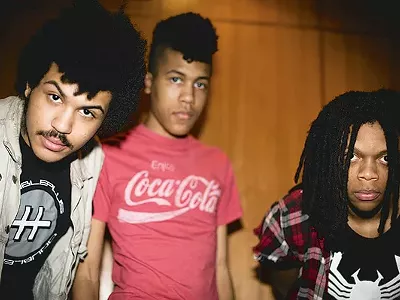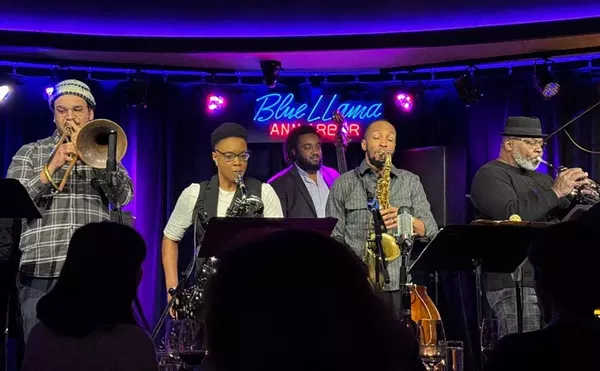Greg Dulli wasn't content with a regular old record deal. Signing a lucrative contract, being on a major label, bringing his uniquely soul-infused alt-rock to the masses — all of it was enticing, but it wasn't enough. Dulli's ambitions weren't merely more visionary — they were also more visual.
So when Dulli — along with his cohorts in the Cincinnati band Afghan Whigs — accepted Elektra Records' offer in 1993, part of the deal stipulated that the label would not only fund their album, but also a feature film scripted by the frontman. It was an unprecedented concession. Unfortunately, Elektra never followed through.
"We developed a script. We put everything in place, then it just went into hopeless turnaround," Dulli said of his defunct film in a recent phone interview. "Then everyone walked away and a couple of people died, and that project died with them."
While Dulli didn't get into specifics about who passed away during the interim, he did elaborate on how the lyrics he has penned for the Afghan Whigs helped him exercise the sense of imagery and eye for detail that he had once hoped to apply to the screen.
"I think of aspects of life as cinematic. I want to create a three- to four-minute world that is an escape from your everyday life," he says of the Whigs' songs, which he equates with auditory mini-movies.
Dulli's auteurist ambitions may have gone unrealized, but he still has friends in the film industry. Those connections helped him net a gig for Mark McGuire (former guitarist for the lauded Ohio band Emeralds), so that McGuire could score a small film in Los Angeles. McGuire returned that favor, supplying guitar riffs for the Whigs' latest album, last spring's Do to the Beast, an album far edgier than the band's previous releases. More surprising was that it was even released at all, given Dulli's multiple claims over the years that the band was utterly defunct.
"He thinks differently than I do," Dulli says of McGuire, adding: "A lot of the time his guitar doesn't sound like a guitar. It sounds like a synthesizer. Or a gas. He's very much an alchemist. He creates sounds that I've never heard before. What he brought to my songs is immeasurable."
Dulli has equally high praise for some of Do to the Beast's other prominent collaborators, especially Van Hunt, a new age soul singer, whom Pitchfork praised as giving a rumbling, "truly killer Bobby Womack impression" on the album highlight "It Kills."
"He has effortless power," Dulli says of Hunt, adding: "It reminded me of seeing Björk singing up close 15 years ago. For me to sing like that, I'd have to puff up my body, it'd an all-body exercise. He can probably sing like that while lying in bed."
Having new contributors like Dulli and McGuire assist on the record helped the Whigs get the fresh started they needed. Pitchfork said in its review that "Dulli seems less interested in rehashing the raw rock-quartet attack the Afghan Whigs mastered in the '90s than he is in building on it. The pummeling math-rock riff of 'Matamoros' and the impossible breakneck pace of 'The Lottery' recall the band in spirit if not precisely in sound, and opener 'Parked Outside' may be the heaviest thing he's ever committed to tape ... In other words, no one involved [on] this album seems terribly concerned with picking up where the Afghan Whigs left off more than a decade and a half ago, and nor should they be: The last thing we need from the Afghan Whigs is '90s nostalgia."
Few would blame the band for being tempted to relive those past glories. During that heyday a little more than two decades ago, the Afghan Whigs released Gentlemen in 1993. Today, critics at sites like sputnikmusic.com call the album a "forgotten and underrated masterpiece," before uniquely labeling the band as "Alice in Chains meets Nina Simone." After releasing several similarly acclaimed discs throughout the '90s, and Dulli achieving other milestones — like collaborating with Nirvana's Dave Grohl, R.E.M.'s Mike Mills, Sonic Youth's Thurston Moore and others on the soundtrack for the film Backbeat about the Beatles' early hits — the Afghan Whigs seemed to have run their course. In 2001, the group split amicably, distributing a press release that "... claimed the geographic disparity and family obligations of its core made it impossible for them to create new material together." Dulli went on to work on his own solo, far more restrained side project called the Twilight Singers, telling the media that the Whigs would never regroup.
Those claims proved to be false, and, much to fans' delight, Dulli went back on his word and re-formed the group, minus original guitarist Rick McCollum and original drummer Steve Earle. In 2013, the band performed at the SXSW festival, inviting the most unique of guests onstage — R&B pop star Usher. Audiences reacted enthusiastically, and Dulli realized that he wanted the reunion to last past a few one-off gigs.
"We went out then, played all the old records," he says. "We were encouraged by many people to continue doing other shows. My only condition was to make new material too."
The ensuing record, Do to the Beast, retained the grooving Motown warmth that made the Whigs famous in the first place. In its review, Mojo magazine said, "The deep soulfulness that always set the Afghan Whigs apart from the pack was no mirage, and on Do to the Beast, it has matured with grace and power."
Dulli says that soul backdrop was integral not only to the band, but also his own upbringing.
"When I was 3 or 4 years old, I remember my mom listening to Motown and Stax around the house," he says of the labels that released classic soul albums a half-century ago. He adds: "My mom was a teenager when I was born. So she was listening to what teens listened to. I remember hearing Marvin Gaye and Stevie Wonder and Smokey Robinson at an early age."
Dulli adds that he engaged with those early soul hits right away, finding a connection that would last throughout his professional career. Of his initial exposure to the genre, he says, "I loved to dance to soul. I loved to sing along; it was eminently singable, incredibly memorable. It stuck to me like glue. It's pop music, really, but it's pop music rooted in the black experience. That's what it meant to me."— mt






